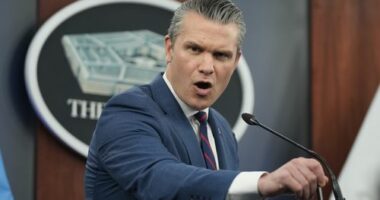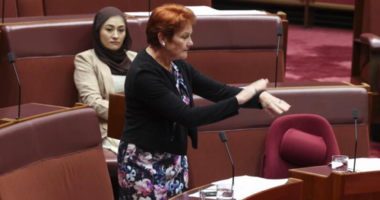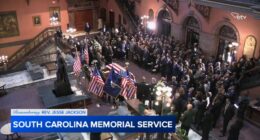Share this @internewscast.com
Following the announcement made on Friday, the White House has sought to calm nervous companies by clarifying that the fee will not impact current visa holders, and that H-1B employees traveling internationally will not be stuck, unable to return to the US due to the fee. This new policy became effective at 12:01 am Eastern time on Sunday.
Despite these assurances, as noted by Leon Rodriguez, a partner at the law firm Seyfarth and former director of US Citizenship and Immigration Services under the Obama administration, some are still advising their H-1B employees to avoid travel until there is more clarity.

Giovanni Peri, the director of the Global Migration Center at the University of California, Davis, acknowledges that while there are instances of the program being exploited – such as using mid-level coders to replace well-paid Americans – these are not common.
He explains that most H-1B visa holders are indeed highly skilled workers who are challenging to locate. “These individuals often contribute to company productivity and innovation,” Peri stated.
“They have complemented the work of Americans, and they have allowed growth.”
What impact will the H-1B crackdown have?
Brown said that many tech firms can probably afford to pay US$100,000 to bring in skilled workers.
“Nonetheless, the upfront fee will clearly be too high for many companies to stomach,” he wrote.
“In the previous year, the healthcare, retail, and accommodation (and) food services sectors accounted for a quarter of H-1B visas combined, and businesses in these areas might struggle to manage the high fee,” he added.
The substantial fee increase – along with other immigration restrictions introduced by the Trump administration – is expected to decrease the US labor supply and in turn, elevate wages, according to Brown.
Foreign workers like Alan Wu are worried – and stunned by the speed with which Trump disrupted the H-1B process.
“Can you release some policy which impacts tons of people just like that?” said Wu, who is working in Indianapolis as a data scientist for a pharmaceutical company.
He is working legally on his student visa after earning a doctorate. He’s failed to win the H-1B lottery for two consecutive years. And he’s now rethinking his plan to live permanently in the United States, where he’s lived for more than a decade.
“I am definitely concerned about my job now that the cost and risk of hiring a foreigner is so high,” he said.
Navneet Singh, who runs a consultancy “Go Global Immigration” in India’s Punjab state, said changes to H-1B visa policies are likely to significantly impact future migration to the US, particularly from India.
“Trump is trying to suffocate new immigrants who are skilled, so that they won’t take the jobs away from the average American. But by doing so, they will be making (US) production expensive,” Singh said.
He said the new policy is likely to create advantages for competitors in other countries. “Countries like France, Netherlands, Germany and Canada are set to gain from this move,” he added.
Some Indian students aspiring to pursue higher studies in the US are disappointed. “It feels like a door closing,” said one aspiring student who requested anonymity.
What businesses will be hurt the most?
Greg Morrisett, dean and vice provost at Cornell Tech, said startups and small businesses are likely to be the most affected by the fees since there’s “no way they can” pay them.
Cornell Tech, for instance, has launched about 120 startups and the “vast majority” have students coming from overseas. The result? “They’ll pick up and move to Europe or Asia, wherever they can find,” he said.
“The big tech companies will likely move a lot of operations and things into other countries. We saw this when, for example, you know, Ireland made it really attractive from a tax perspective. All of a sudden all the headquarters move to Ireland,” Morrisett said.
And startups, he added, “the next Amazon, the next Google will give up here and go somewhere else and then we won’t have that advantage in the next generation of tech leadership.”













